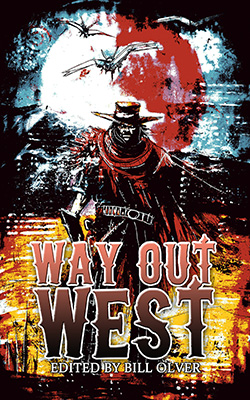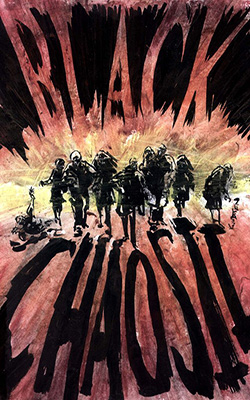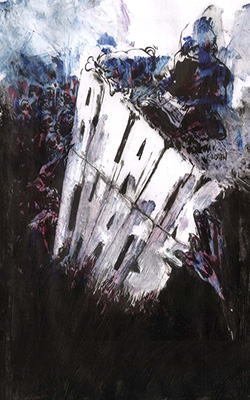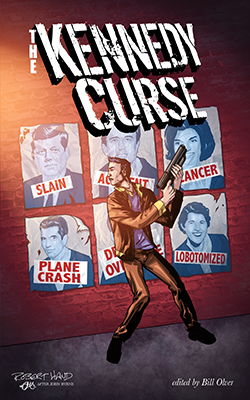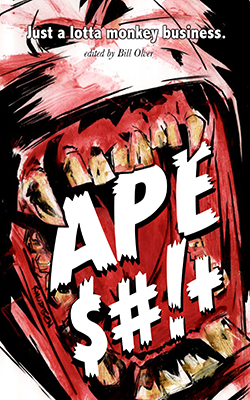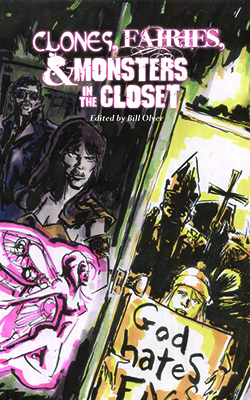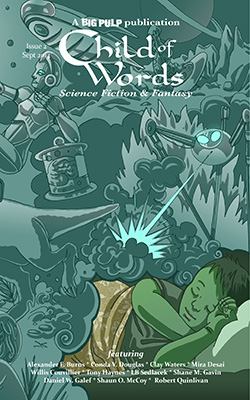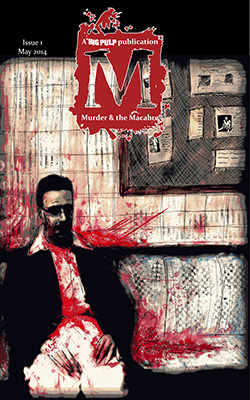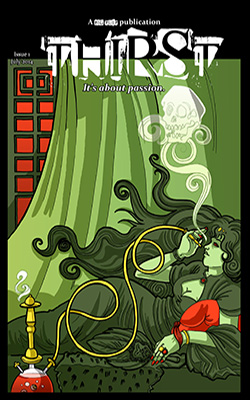Willie stood by the tracks. He looked one way, then the other, seeing nothing but scarred walls of basalt. He took a final swig of vodka and tossed the bottle. The nearest house was at least five miles away.
He loved trains. He’d seen the Alps and most of Germany with a Eurorail pass, and on a side trip to France almost frozen to death in a cattle car. All that the summer after college when he was half-drunk on the freedom and whatever local beer he could find. Later, when he married and moved out west, it was always planes and Avis or taxis and tour buses, but no trains, no trains. Work, more work, and a wife who didn’t travel.
It was almost time.
Willie, or William as he was known to his co-workers and to his neighbors at 721 Alder Lane, bent down to feel the track. Did it still work like that, he wondered, a quiet vibration? He didn’t feel anything but it hardly mattered; the noon express was on its way. He almost laughed at the thought of a penny, and felt his pocket for change.
Earlier that morning he’d packed his suitcase, neat as always, with changes of socks and underwear for a typical five-day sales trip and left Meredith the usual note. Back in five, it read. Once, he tried xeroxing the note, so he could reuse it and save on paper, but thought better of it when she’d complained. He left it on the table under to the cactus-shaped saltshaker they’d won at the fair. This time he'd added exclamation points. The suitcase was now in a dumpster behind the Waverly Building and his car at the airport parking lot. It already felt like a lifetime ago.
Which trip had it been? Maybe all of them …
He’d been sitting by the pool. He never sat by the pool, didn’t swim, and spent most of his time indoors at the bar where, underneath his brown suit, he was as white as alabaster and quite capable of cracking if mishandled; the alcohol barely helped. But after two hours of no air conditioning and no indication of when it would be fixed, that and the sense his calves were beginning to swell, he’d changed into his shorts and taken refuge outside under an umbrella, dangling his feet in the kiddie pool.
High above the hotel scoops of puffy white cumulus floated, docked with others, and set off again, reminding him of his endless quest: piling up his sales numbers year after year. Eight months in and he was way, way behind.
“Duck?”
William shook the towel off his head, looked around at the other heads, marooned and motionless in the glassy-eyed heat, and resumed his position in the chaise-lounge. He'd been daydreaming about inventory, where everything shipped in one, fluid motion. As sales manager for Venture Electronics, his time was divided between parts and people. People and parts. Sometimes he wished he could reverse roles for a day: talk to the parts and stockpile the people—warehouse them and their problems.
The towel was no sooner back when a yank on his big toe brought him upright. A child stared back at him, an outstretched hand holding something yellow.
William tried to focus. His prescription sunglasses had broken the second day out and he wouldn’t be getting another pair without company approval. His wife certainly wouldn’t be buying him any.
“I’m sorry. Is Willie bothering you?”
At first William couldn’t make out the face, backlit as it was by the sun. But the voice—soft, smooth and with a hint of confusion—pricked his attention. In the trade they called it Susel, sort for "sure sell." When you heard a voice like that, you heard vulnerability, a guaranteed sale. He’d seen the studies, read the research, and applied the technique with mixed results during his car-dealing days. He was always analyzing voices. They could tell you so much. Sometimes too much, he thought, thinking of his wife. "Humph,” William mumbled, climbing back from his sales figures, wondering where the curly-haired kid had popped up from.
“Come on, Willie,” a woman said, moving away from the sun as she picked up the boy. The duck dropped from the child’s hand, landed on William's shoulders and rolled down his chest, a wet stain in its wake. He handed it back to the woman. With his eyes shielded he got a better look.
“Oh, I’m sorry,” she said, looking down at his shirt.
“Don’t worry about it. I could use some cooling down.”
“Couldn’t we all,” she replied. “Say, would you mind watching Willie for a sec? I'm going to bar to get us something cold to drink.” William watched the Cuervo banners flutter in the distance behind her. He could use another drink.
“No, I don't …"
“Think of is as a way to make up for your cleaning costs. Silk shirts and chlorine are not a happy mix.”
“Well,” he replied, not sure what else to say, as the child laughed and giggled and pressed the duck against William’s nose, as if it was the funniest game in the world. The woman turned and headed toward the bar. She wore a sleek, one-piece black suit, with a red flower on the hip and deeply tanned skin everywhere else. What he remembered then, as now, was the scar on the back of her thigh, a thin white line, running from the inside of her knee to the swell of her ass. In his business, a defect meant disaster. But on her, it only accentuated the shapeliness of her legs. He wished he could feel the same way about his bald spot.
Ten minutes passed. He’d tired of baby talk and settled on squeezing the duck. Quack. Quack quack. Willie found this endlessly funny. William had forgotten about the time. Where was she? Jesus. He didn’t even know her name.
“There you are,” he heard her say from behind. He turned and saw she was holding three drinks pressed together against her chest, saw how the effort only accentuated her cleavage; the creamy rims of her untanned breasts brimmed just above the black edge of her top. He brought his eyes quickly up to hers.
“I can’t … I can't do anything right today,” she said. She put down the drinks and wiped back tears with a cocktail napkin. She'd spilled the first set of drinks, she said, and now had to get back to her room to give Willie his insulin shot. “I’m sorry for all the trouble.”
William sipped his drink and studied her sunglasses, so as not to be caught staring at her cheeks and neckline.
“This trip," she said, "it's so I, I could, or rather we could get on with our lives. I guess. Whatever that means. As if a trip could cure anything."
"Yeah," said William, hoping his trip would double his sales.
"Doctor's think they know everything."
“I’m sorry,” he said, now aware something bad must have happened, happy that whatever it was, it hadn’t happened to him. Let her talk, he thought. That always helps.
“It’s easy enough for Willie; he thinks heaven’s just another adventure and that his Daddy’s coming back. Like some cartoon character."
She continued and William listened with what he thought was an earnest look. He felt sorry for her, sorry she hadn't learned life was filled with trouble, and you lived and succeeded by having a backup plan. He stroked the boy’s hair, its yellow strands felt like flax against his fingers.
”You and I have the same name,” he said. He said his name aloud and looked up at the woman. “Maybe they've fixed the air conditioning. I’ve got to get back.”
“And here I am blabbering on. Come on Willie, time for your nap.”
“Willie go bye-bye,” the child said, taking his mother’s hand.
“You’re William then, right? I’m Donna. Thanks for the looking after him." He watched her cross to the other side of the pool, sling a beach bag over her shoulder and pick up a pair of crutches. He grabbed his newspaper and towel and caught up with her.
“I didn’t realize. Can I give you a hand?” he said.
“I try to walk as much as possible, but after a while the pain's too much.”
William took her bag in one hand and Willie’s hand in the other. He and Meredith had wanted kids, their own kids. They'd even thought about adopting but it never quite happened. Maybe it was his work, always on the road, and the fact that his year-end bonuses had disappeared. He and Meredith had wanted a lot of things
He glanced at his watch. Still plenty of time before his seven pm presentation¬¬; he might even work this Good Samaritan experience into his talk on teamwork.
Back inside the air conditioning was still off, and it was slow going with the crutches. By the time she opened the door to room 1215, William’s shirt was soaked under both arms and sticking to his back. The heat made him dizzy; he made a mental note to start working out again. At least my room's on the same wing—a shower will feel good, he thought, as he placed the bag down on a table just inside her room. And that was the last thought he had for another twelve hours.
When William woke up the clock glowed a secret code: 5:30.
He’d missed his presentation. Or had he?
He did an inventory. He still had on his clothes, rumpled though they were, but what a headache. Plus his shoulder was sore, probably from sleeping the wrong way. When he moved, his arms and legs felt like sand bags. He'd had a couple of drinks poolside, to relax before the meeting. Three, four maybe, but that explained nothing. Was the heat too much at this altitude? Denver could be trouble in the summer. Where had he read that? Then he remembered the woman, walking back to her room, studying her back, the thin black straps of her bathing suit, wondering what it would feel like to slip them off her shoulders. And then a pain in his own shoulder.
Jesus. 5:30 A.M.! He splashed cold water on his face. What happened? Had he done anything? He’d been married nineteen years and in marriage, as in his job, the principal was consistency. (His few transgressions only proved the rule.) It wasn’t the big sale, or the little sale, it was the consistent sale, a point he highlighted at all his presentations.
He tried to shake the grogginess as he showered, dressed, packed and figured an excuse for missing his meeting. Heatstroke? He'd have to read up on it in one of Meredith's medical books.
He called the front desk.
"Room 1215, the Johnsons?" the clerk said, "they checked yesterday." They? His hearing must be off. That wasn’t heatstroke. Maybe booze. Maybe getting old. Whatever. He had a plane to catch.
Three weeks later the first photographs arrived.
The envelope was marked “personal.” For Willie, someone had written in big, black letters. He hadn’t been called that since grade school, when he and the McKenzie brothers gave each other nicknames. Willie, Drilly, and Toboggan. He’d lost touch with the brothers but had heard that Toboggan, ironically, had been killed on the slopes while filming an extreme ski movie.
There was no note. Just photographs. He gagged. He stifled the reflex and gagged again. The photographs were of two people on a bed: a man and a child. Both naked. This isn’t happening, it can’t be happening, he thought, as he stared at himself and the boy named Willie.
In the distance he could hear the train. It would be along soon. He bent down and placed a penny on the track.
For Sale
originally published March 10, 2008
David Melody lives in the Columbia Gorge region of Washington State. "For Sale" is from a series he is working on titled Snap Shots. He has had stories in GHOTI and The Writer's Eye Magazine.


